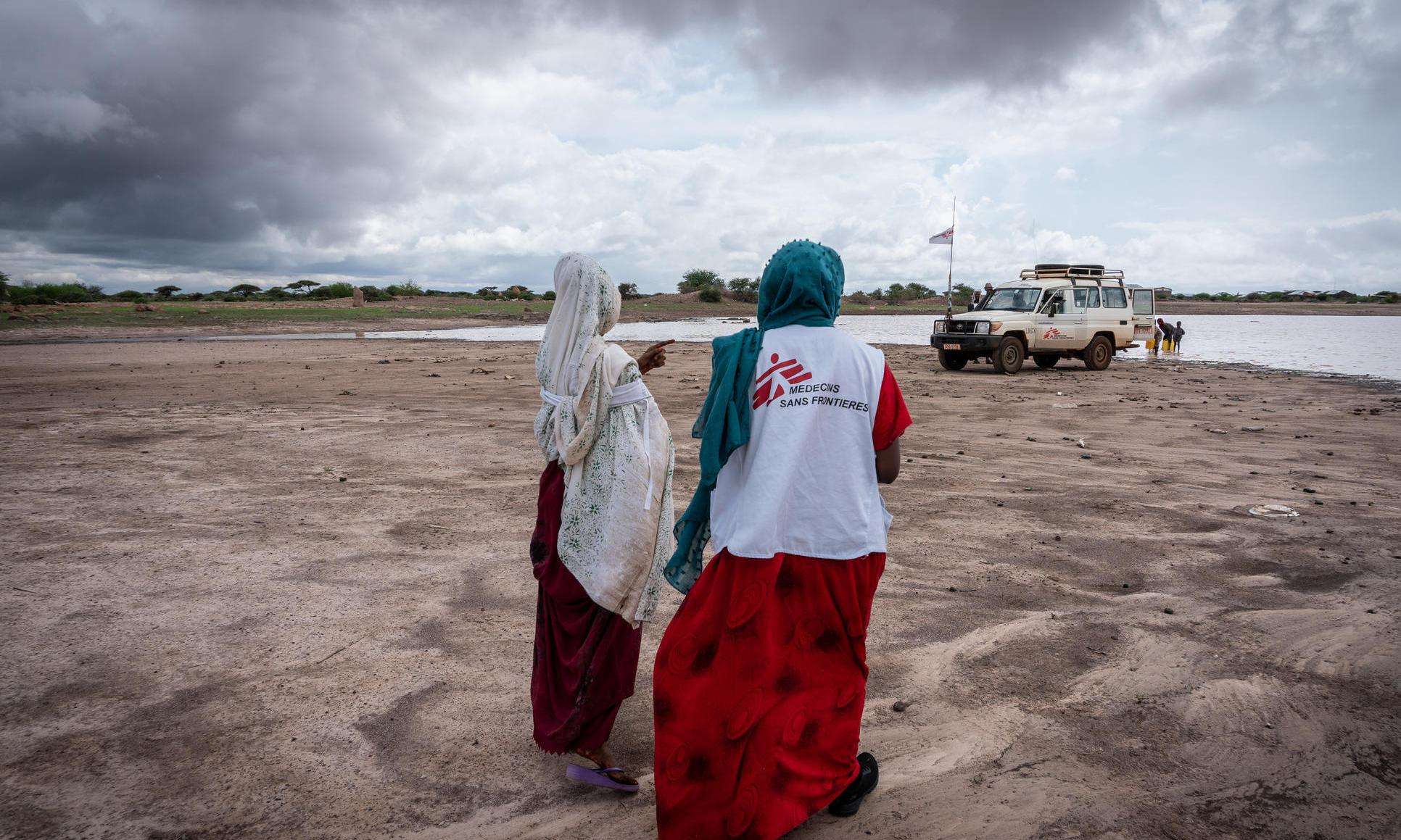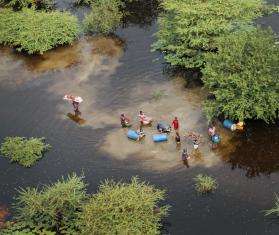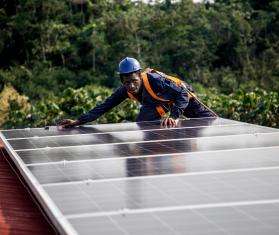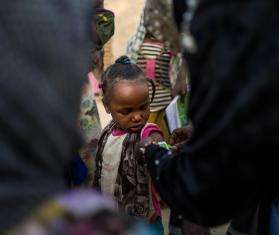The summer monsoon rains in Pakistan can be a welcome break from the intense heat of spring, which this year saw record-shattering temperatures reach as high as 123 degrees in some areas. But this season the heavy rains were relentless. By the end of August, one-third of the country was under water.
Experts warn that the devastating floods in Pakistan are a wake-up call alerting the world to the threats posed by the climate emergency. While multiple factors have compounded the disaster, initial scientific analysis reports that climate change likely contributed to this year’s “monster monsoon.” Pakistan is among the countries most at risk due to the impact of extreme weather events.
The catastrophic flooding affected some 33 million people—including many of our staff in Pakistan. Akeela works with Doctors Without Borders/ Médecins Sans Frontières (MSF) in Dera Murad Jamali, a city in the southwest that was among the areas hardest hit by the flooding. As the waters rose, she had to evacuate from her village along with her parents and younger siblings. One brother and one sister were left behind to take care of the cattle and move the herd to higher ground. But the waters kept rising.
“So many people needed help,” she said. As part of the assessment team, she saw people stranded in makeshift settlements and in villages marooned in a sea of murky water. “I watched as parents crossed the floodwater, seeking treatment for their children,” she said. MSF is running mobile clinics to provide medical care, distributing non-food items, and supplying safe drinking water. We’re concerned about the spread of waterborne and mosquito-borne diseases, including malaria and dengue.

As part of the initial response to disastrous flooding in Pakistan, an MSF team distributes emergency supplies including soap and mosquito nets to displaced families on the outskirts of Quetta.
Pakistan 2022 © MSF

Flooded homes in Rubkona, South Sudan.
South Sudan 2022 © Peter Caton/MSF
The "double injustice" of the climate emergency
From South Asia to the Sahel and Horn of Africa to Central America, MSF has been providing medical care and humanitarian aid for years to people affected by climate change and extreme weather.
“MSF teams are medical humanitarians, not climate scientists,” said Carol Devine, who heads MSF’s project for humanitarian action on climate and the environment. “But after years of witnessing how climate change has likely exacerbated health and humanitarian crises in multiple contexts where we work, we are compelled to speak out about what we see.”
What MSF doctors and nurses see is that low-income and marginalized communities are being hit the hardest by the climate crisis. We see unusually severe flooding as well as drought contributing to spikes in malnutrition. In some places, changing weather patterns result in longer rainy seasons and shifting peaks of infectious diseases. Disaster-related displacement and the increasing risk of traumatic extreme weather events are impacting people’s mental health.
Many people in climate change hotspots face a “double injustice”: those who have contributed the least to the human-made emissions causing climate change are the most at-risk to climate threats, and they have the fewest resources to adapt to and mitigate the dangers.
Climate is one of the factors currently driving hunger and malnutrition across the Horn of Africa, now among the world’s most serious humanitarian emergencies.
In Somalia and Somaliland, people are facing one of the worst droughts in decades after four consecutive poor rainy seasons—with a fifth one predicted later this year. MSF sees people struggling to survive without adequate food and water, and at risk of malnutrition and dehydration. Failing crops and rising food prices—on top of ongoing insecurity and a massive invasion of locusts that ravaged farmland across the region—have forced hundreds of thousands of people to move from rural areas to urban centers. Many have sought refuge in camps for internally displaced people, yet these sites are often crowded and lack toilets, hand washing stations, and clean drinking water. These are perfect conditions for the spread of infectious diseases.
“Somalis are facing a series of crises, one after another,” said Djoen Besselink, MSF’s country representative in Somalia, where MSF is providing aid in Baidoa, Mudug, and Jubaland. “We are hearing stories of desperation, with some people telling us they have faced the impossible choice of leaving one child to die to save others. People find themselves caught in a downward spiral.”
In some places, environmental factors are also fueling an increase in infectious diseases such as malaria, dengue fever, and cholera. As we’re seeing right now in Pakistan, more stagnant water means more opportunities for waterborne and mosquito-borne illnesses to spread.

Young boys make mud bricks in the Shahrak-e Sabz informal settlement for displaced people, located on the outskirts of Herat city, Afghanistan, where thousands of people settled after fleeing drought and conflict.
Afghanistan 2019 © Andrew Quilty

The hunger season is becoming worse each year in the desert regions of southern Madagascar, where years of drought have severely affected harvests and access to food. Madagascar 2021 © Ainga Razafy/MSF
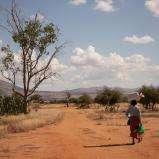
Climate emergency
An in-depth look at how MSF is responding to environmental crisesUrgent action
To help address these alarming trends, MSF recently started a new planetary health project in Mozambique. This is MSF’s first project designed to address the links between climate and health. The project includes mobile teams treating patients at the primary care level, as well as helping to prepare ministry of health facilities to better treat higher numbers of people suffering from climate-sensitive illnesses like malaria and neglected tropical diseases. MSF is committed to carrying out these activities in a way that also reduces its environmental impact.
“As medical practitioners, our job is not only to treat people, but to prevent future illness from occurring,” said Dr. Monica Rull, MSF medical director. “We must not create problems for tomorrow while trying to solve the health problems of today.” With this in mind, in December 2021, MSF set a movement-wide target to slash carbon emissions by 50 percent by 2030.
MSF has a long history of responding to natural disasters, which can leave homes and health infrastructure in ruins and also have a major impact on people’s mental health.
In February 2022, Cyclones Batsirai and Emnati hit the east coast of Madagascar, destroying numerous health centers. The cyclones were the latest in a series of extreme weather shocks to hit communities here in recent years. In response, MSF emergency teams provided health care to people in the remote coastal district of Nosy Varika, where the local hospital and five health centers had been badly damaged.
“We’re really concerned about how this will affect people in the longer term,” said Mathilde Guého, MSF’s emergency coordinator in Madagascar, following the cyclones. “The lean season was at its peak when the cyclones hit, and people have largely lost their sources of income. Many people here were already so vulnerable.”

In addition to treating people who are affected by climate change and disasters in their home communities, MSF also works in refugee and displacement camps across the world. As more and more people are displaced due to climate factors, they are often forced to endure poor living conditions and cramped quarters where infectious diseases spread easily.
Forced displacement can also lead to other environmental threats to health. In Bangladesh, for example, some people have been forced to move from rural areas to the city after flooding contaminated their farmland with saltwater. Many are moving to urban centers to seek employment and secure livelihoods, only to find themselves living in highly polluted neighborhoods and working in hazardous conditions. In the densely crowded Kamrangirchar settlement in the capital city, Dhaka, MSF teams provide primary care and occupational health care for people who have been injured or sickened in the course of their work in the area’s numerous small-scale factories.
The climate crisis is a health and humanitarian crisis— which is why MSF is committed to taking urgent action now to prevent more human suffering.

